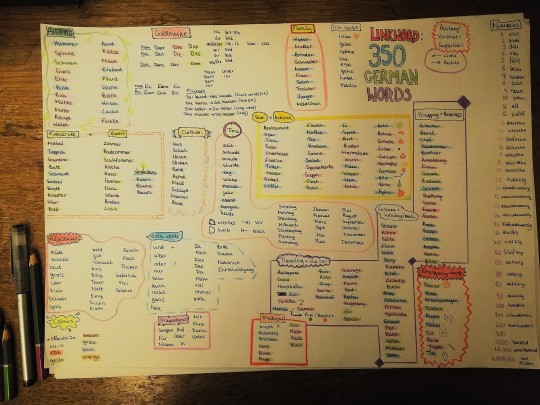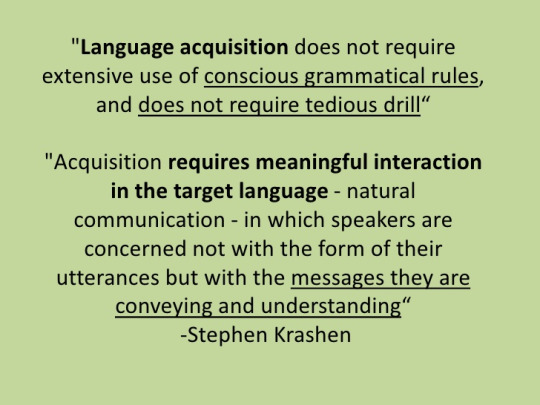Photo










Die Frau mit den 5 Elefanten/The Woman with the 5 Elephants(2009) dir. Vadim Jendreyko
11K notes
·
View notes
Text
The idea of english as a mother tongue is so strange to me, in my head english is how ppl communicate when there's no way in common to communicate, so english as a mother tongue sounds a bit like idk email as a mother tongue ykwim? Like english to me feels like the stuff that's used to fill the empty spaces between languages
83K notes
·
View notes
Text
tired: subconsciously mimicking your partner’s speech patterns after years of intimacy and bonding
inspired: sexually transmitted inflection
521 notes
·
View notes
Text
advanced language learner problems: not knowing if you’re misunderstanding someone or if they’re just not making sense
711 notes
·
View notes
Text
french is NOT the language of love it is not romantic it has not and will not ever make anyone swoon. it is however possibly the funniest language ever. there is nothing more entertaining than listening to a frenchman. clownstongue
24K notes
·
View notes
Text
One time this man approached me in a bar talking in Spanish. So I assumed he was Spanish and we started speaking, we had a whole ass conversation and at some point he was like. So what part of Spain are you from? And I said well I’m Italian actually. What part of Spain are you from? And he was like. I’m Greek.

210K notes
·
View notes
Text
there’s this post going around that’s like ‘what if alien languages had pronouns that didn’t include gender information!’ and there’s about five different enthusiastic replies and like, i get the excitement but i’m begging you to learn about languages other than english
46K notes
·
View notes
Text


12.05.2021
pretty libraries and less pretty physics revision
404 notes
·
View notes
Text
Spent my Sunday evening learning German vocab from an 80s book for business and tourism language learning

If anyone wants a scanned copy for any reason lmk
4 notes
·
View notes
Text
Spent my Sunday evening learning German vocab from an 80s book for business and tourism language learning

If anyone wants a scanned copy for any reason lmk
4 notes
·
View notes
Text
One uncanny aspect of translating is when I am grappling with a sentence that would sound particularly wrong if I tried to preserve any part of the original structure or idioms, because nothing about it matches the way one would phrase such an idea in my language, so what I need to do is mentally divorce the sentence from its syntax and vocabulary, to try and find how my language would give form to the same concepts. It always makes me wonder, what am I working with here? What is left when you remove the grammar and specific word choices from a sentence? I don’t know, a shapeless mental porridge of pure meaning, a nebulous feeling of what another brain has tried to express. I find it amazing that your mind knows just what to do with something so unfathomable—that it’s just like “right, right, give me a minute” as it distillates meaning out of words like it’s nothing then lassoes it down from the platonic realm of forms to give it a completely new shape. What is ‘meaning’ and how does it exist in your mind in this liminal moment after you’ve extracted it from a foreign language but haven’t yet found words in your own language that can embody it? I don’t know.
10K notes
·
View notes
Text
Good evening to all 7 of my followers:
So I've started learning German pretty recently and I'm really enjoying it, although I'm very very beginner. Obviously one of the main reasons to learn a language is to communicate, and at first I was really excited at the idea of speaking German on holiday, but I'm starting to realise that what with restricted travel and all, the likelihood of me flitting of to Germany and meeting people is actually pretty small. So I was wondering if anyone on here knows any German blogs who'd fancy messaging a bit to help me practice? Just to remind me that I'm not doing all this work for nothing, it is a real language spoken by real people! Again I'm super new at this so it would really be just a couple of messages, like introduction pen friend type stuff.
I would be really grateful for any advice/recommendations!!
Tl;dr looking for a German language exchange to message/email
#german#langblr#studyblr#german language partner#language exchange#languages#learning languages#please spread the word#many thanks in advance
3 notes
·
View notes
Text
My favourite language-learner, Matt vs Japan, and my favourite linguist, Stephen Krashen, uploaded an interview together a few days ago. I highly recommend watching this - it felt incredibly relieving in many ways. Here are the main arguments put forward in the video:
There are two systems: Language Acquisition and Language Learning.
Language Acquisition is the way a child naturally learns their native language - subconsciously understanding implicit meaning through comprehensible input (listening and reading materials that are slightly above their current level of ability).
Language Learning is the way we typically learn languages as adults - through formal instruction, grammar, rules, explicit explanation.

This reminds me of something I was talking to my mum about today. I mentioned that many native speakers of English will use ‘was’ as 1st person conditional, instead of ‘were’ - for example “If I was a millionaire” vs “If I were a millionaire”. I asked my mum: “Which one do you think is correct? If more and more people keep saying ‘was’ instead of ‘were’, when does ‘was’ become the correct version?” and she said “It doesn’t matter, because we all know what the speaker means.” I think this illustrates the value of communicating meaning (acquisition) over having perfect form (learning).
Comprehensible Input
Input is reading and listening (while output is speaking and writing). When we say that language acquisition is done through comprehensible input, this means that the input is slightly above your current level.
The ideal input is both comprehensible and compelling (interesting). Matt points out that unfortunately for most beginners and some intermediate learners, most input that is comprehensible, is boring (like kid’s shows), and most input that is compelling (like adult’s shows) is too hard to comprehend.
The Monitoring Hypothesis explains the influence of learning on acquisition. Acquisition is the utterance initiator, while learning/monitoring plans, edits, and corrects.
According to Krashen, the role of monitoring is minor, being used only to correct deviations from “normal” speech and to give speech a more ‘polished’ appearance.
- Over-users monitor all the time.
- Under-users have done zero “learning” (explicit learning of grammar, rules, etc.) and rely solely on subconscious knowledge acquired naturally.
- Optimal users monitor appropriately.
Apparently, extroverts typically under-monitor, and introverts and perfectionists typically over-monitor. I definitely fall into the second category. Just a few days ago in my iTalki German session, I realised my tendency to avoid using words I can’t explicitly remember learning, and that this has turned out to be my downfall.
We speak better when we feel that we belong in ‘the club’
I can go on a tangent in German to someone else in my C1 German class with complete confidence, but by no means can I do this with a native speaker. Stephen Krashen argues that this is because we identify as part of the same group - we are friends (as we’ve had many years of classes together) and we are learners of German.
- If I were to speak with a native speaker, my German would be worse.
- If I were to speak with a stranger (who is not a native speaker, like me), my German would still be worse, because I’m not familiar with them.
When we are aware of the fact that we do not belong to the same group as the other person, we automatically tend to make more mistakes.
My boyfriend is a native speaker of Serbian, and so are his parents and many of our friends. So, I don’t belong to their club. On the other hand, I am most familiar with my boyfriend, so I can speak with him in Serbian most easily. Next, I can speak with his friends most easily, because we belong to the same age group. I find it hardest to speak with older adults (in their 50s and 60s). This is when I make the most mistakes; this is when I ‘freeze’.
To be honest, I think this hypothesis is more an indication of how we feel most comfortable in general around those with whom we have more in common, and therefore experience more nervousness in general, the more different/unfamiliar a person is to us. It is this nervousness that causes us to be more hyper-aware of ourselves, over-monitor, and therefore ‘freeze’ or make more mistakes.
Input is more important than output
Both Stephen and Matt agree that input is more important than output, with Stephen describing output as more of a demonstration of language that has already been acquired through input, rather than a method of language acquisition.
With this being said, Matt also believes that output has still been quite helpful for him in improving his fluidity and retrieval of his acquired Japanese. I’ve had the same experience with output, especially in writing.
Stephen, on the other hand, after prioritising input, has been able to go several years without speaking French or German, but they still remain his ‘best’ languages, and he has no problem producing them at a whim. He admits he has no opinion nor evidence to support whether output aids in acquisition or not.
———————-
TL;DR The main things Stephen Krashen wants you to take out of this are:
1. Interesting and self-selected comprehensive input (reading materials and TV shows/movies/videos) are the best way to acquire a language.
2. Language acquisition (where the priority is communicating meaning) is more valuable than language learning (where the priority is correct form, applying rules correctly, etc.)
These are all, of course, theories. You can agree with them, or disagree with them. You can choose to try to implement these methods, or choose not to. Do what works best for you!
866 notes
·
View notes
Text
This has been said by other people, like, a lot, but oh my gosh it is exhausting how American centric this website is. Like people will just make posts about something that is literally only relevant to the US and phrase it like it's happening everywhere, with just no awareness that other countries exist and not everyone reading their post is American. Like yes, make posts about your politics etc, but don't just assume that everyone who reads your post is in the same position as you?
4 notes
·
View notes
Text

11.07.20
Studying. Some more studying. Taking a little study break. Studying again.
That has been my routine for the past 2 weeks.
Today I took an extended break and made spaghetti for my family.
Also I should probably start working out. I’m literally the definition of couch potato.
80 notes
·
View notes
Photo

The poster in an elevator says:
Neighbours!
For the first time in history, we can save humanity by lying on the couch by the TV. Let’s not screw up this mission!
Облажаться - slang, to screw up, to fuck up.
785 notes
·
View notes
